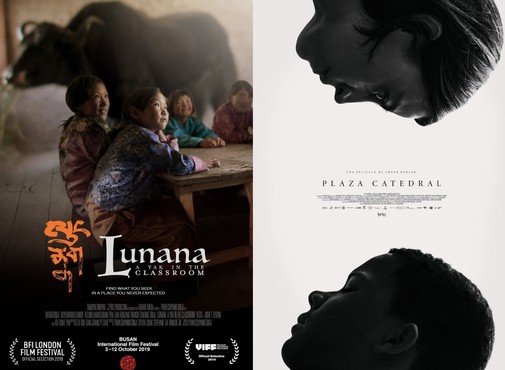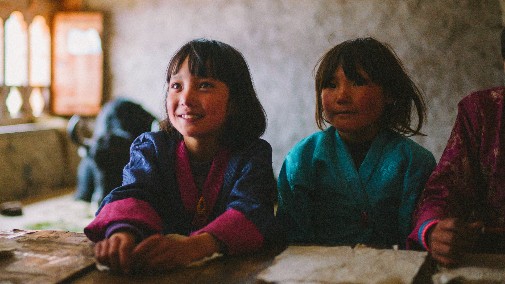
The Academy has announced its shortlists, and there aren't many notable surprises to point out. However, two exciting inclusions in the Best international Film front were Bhutan's Lunana: A Yak in the Classroom and Panama's Plaza Catedral. By coincidence, both pictures have powerful behind-the-scenes stories that might have helped boost their profile. Bhutan's case is a story of underdog perseverance, while Panama has a heartbreaking tragedy attached to its film.
Did the Academy make the right choice? Let’s find out…

LUNANA: A YAK IN THE CLASSROOM (Bhutan)
The second film Bhutan submitted in its history, Lunana: A Yak in the Classroom faced unexpected AMPAS decisions before it got on the eligibility list. Last year, the country tried to submit it, but the flick was disqualified since an Academy-approved committee hadn't signed off the selection. The ruling came so late that the Bhutanese government had no time to appeal or establish an official group for Oscar consideration. Still, they tried again this year, having formed the National Film Commission of Bhutan. It includes, among its members, Khyentse Norbu, the director of the country's first-ever submission – 1999's The Cup.
The choice was unanimous, so Lunana: A Yak in the Classroom was re-submitted. As luck would have it, after all these tribulations, it made the shortlist. It seems underdogs can triumph in real life, too, not just Hollywood fairytales. Speaking of clichéd movie narratives, this Bhutanese crowd-pleaser follows a rather conventional story model. It's the tale of a fish out of water, a city mouse in the country, a teacher who's taught a valuable life lesson by his students. It's the story of Ugyen, an aspiring singer who dreams of immigrating to Australia while working as a teacher in modern-day Bhutan.
As punishment for his lackadaisical attitude to the profession, he's sent to teach at the most remote school in the world. Nestled between the Himalayan mountains, Lunana is a harsh place to live in, devoid of stable electricity or most comforts, so cold no teacher stays there during the Winter. Yet, gradually, Ugyen learns to love his job, the people, and Lunana. He also learns about the uses of Yak excrement, for that matter, and its importance as the primary source of fuel for many of Bhutan's mountain communities. All in all, Lunana: A Yak in the Classroom is an inspirational dramedy with few surprises.
Still, even a curmudgeon with no patience for heartwarming tripe must admit when their heart is, indeed, warmed. I confess that coming from a family with countless teachers across generations means I'm primed to fall for movies that celebrate education for education's sake, the importance of the pedagogue, the genuine value learning can have in a child's life. Adding to that, Pawo Choyning Dorji's directorial debut is a love letter to the village of its title, having been shot on location with the people of Lunana playing many of the parts. The camera neither glamourizes their material misery nor does it wallow in it. Instead, it tries to find joy and ennoble the spirit.
While such expressions are as commonplace as this movie's plot, it's fair to say that the setting is like another character in Lunana: A Yak in the Classroom. DP Jigme Tenzing captures the grandeur of the natural vistas with as much loving attention as it contemplates fresh Yak excrement. In other words, it's a visually ravishing film where the relationship between man and landscape sings a song of unspeakable beauty. Though it dips its foot in saccharine tonalities, Lunana: A Yak in the Classroom's lessons rarely feel forceful. Didacticism is kept at bay by the cineaste's earnestness, their grace and craft.
Even though I wouldn't have personally placed it in my ideal shortlist, it's easy to see why the Academy was so enchanted with Lunana: A Yak in the Classroom. B

PLAZA CATEDRAL (Panama)
Before one considers the merits of Plaza Catedral as a film, it's crucial to point out some off-screen facts. Months before Abner Benaim's picture celebrated its world premiere, the adolescent leading man Fernando Xavier De Casta was shot. The teen played a street kid nicknamed Chief in Plaza Catedral, a youth who's terribly vulnerable despite the menacing posturing he performs to those around. One day, he ends up on the doorstep of a wealthy foreigner in the Panamanian capital, begging for help as he bleeds out from gunshot wounds. In fiction, he lived. In reality, De Casta wasn't as fortunate.
This terrible instance of life (almost) imitating art must color one's reaction towards the film. Perchance some will be more benevolent, but I fear these happenings had the opposite effect on me, highlighting how abstract the young actor's presence ends up being. You see, Plaza Catedral doesn't treat Chief so much as a character than as a plot device or a sociological symbol. In Benaim's script, the boy exists to facilitate the character study of that rich woman whose help he seeks. Ilse Salas' Alicia is the person around which the narrative revolves, exploring her grief over a lost child and the economic hierarchies that lead to her regarding Chief like a nebulous mystery, as unknowable as an alien from another planet.
Though she learns to care for the wounded child, Alicia can never transpose the invisible barriers that separate her from the teen. Consequentially, neither can Plaza Catedral. On the one hand, it's refreshing to see a film tackling class divides without resorting to pat conclusions and empty platitudes about mutual understanding, individual love as the key to solving the world's problems. On the other, there are limits to such an approach. At times, the film falls into coldness, taking its tonal cues from the glossy surfaces of Alicia's well-appointed high-rise. Considering the main character's architectural proclivities, this twinning of mood and set design feels eminently appropriate.
Furthermore, Plaza Catedral goads its audiences into regarding Chief by the same perspective as Alicia. There's a pall of suspicion over the boy, wounded or not. A distrust that later events seem to confirm while not contradicting the script's theoretical humanity. The actors find complexities in these archetypical figures, though it's not enough to transcend the text's hints of reductivism. Salas' internalized take on Alicia is a terse wonder, disciplined to brittle extremes, while De Casta is all surly charisma. Their dynamic is volatile, enlivening the frame with a jolt of electricity that Benaim's camera never weaponizes to its fullest effect.
The picture's chilly elegance works within the elitist milieu of those who get to build the world according to their privilege. However, it runs into a brick wall when the scenario takes Alicia deeper into her wounded ward's cosmos, Panama City's slums, and their urbanistic discord. Plaza Catedral acts as if it's suddenly deepening our perception of the social milieu and Chief by extension. Still, the observations remain aloof, as superficially glossy as the modernist apartment of its true protagonist. A sudden jolt of violence tries to provide catharsis. Sadly, it read as cheap exploitation that fails to confront the serious issues the project purported to explore.
Good intentions and two formidable actors make Plaza Catedral worth seeing, but, in the end, I'm not sure it does the Chiefs of the world any justice. C
Oscar Odds? Considering its competition, neither Lunana: A Yak in the Classroom nor Plaza Catedral appear to be in contention for an Oscar nomination. But, of course, the Academy is known to make unexpected choices in this particular race. They regularly ignore prestigious fare to the benefit of more obscure flicks whose sentimentality and easy moralizing can be appealing to an awards voter. Maybe these two can be 2021's Better Days and The Man Who Sold His Skin. I wouldn't bet on it, but who knows? Stranger things have happened.